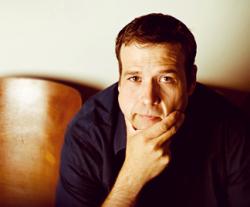 Donald Miller is the author of several books including A Million Miles in a Thousand Years: What I Learned While Editing my Life (2009) and Blue Like Jazz: Nonreligious Thoughts on Christian Spirituality (2003). To connect with him, read his blog, like him on Facebook, or follow him on Twitter.
Donald Miller is the author of several books including A Million Miles in a Thousand Years: What I Learned While Editing my Life (2009) and Blue Like Jazz: Nonreligious Thoughts on Christian Spirituality (2003). To connect with him, read his blog, like him on Facebook, or follow him on Twitter.
Earlier this month he posted, “Should the Church be Led by Teachers and Scholars?” In the article he questions the centuries old norm of the church being led by clergy scholars who possess academic credentials (all of the denominations I have been formally affiliated with, for example, require a seminary education for ordination). In describing the church of the early twenty-first century, he states that it:
. . . is a robust school system created around a framework of lectures and discussions and study. We assume this is the way its supposed to be because this is all we have ever known. I think the scholars have done a good job, but they’ve also recreated the church in their own image. Churches are essentially schools. They look like schools with lecture halls, classrooms, cafeterias and each new church program is basically a teaching program.
He also asks then answers the question of how we reached the place in the life of the church where it is the only institution, apart from school systems, overseen by scholars:
. . . the reason is the printing press. The government once controlled the church, but that ended when the printing press was invented and people could read the Bible for themselves. And the scholars were the only people who could read, so they got the job of church leadership by default. So church leadership went from fishermen, to government workers, to scholars.
So What?
Since the current system is all we have ever experienced, Miller believes:
. . . we have slightly distorted ideas about Christian discipleship. If you want to grow in Christ, you should study more. Christian growth, then, is an academic path. And like educators, we only advance to become higher level educators. The point of learning is always teaching which produces further learning and then more teaching. The only difference between the church and another educational institution is that nobody ever graduates from the church. We just keep going to school.
Miller’s words are incredibly insightful and challenging. It is now widely accepted that the American church, especially in its mainline form, was birthed by the reformation but shaped by modernity. As the culture shifts from modern to postmodern the church is struggling to find its way. Thankfully many denominations are actively struggling with what it means to be a denomination and how better to reshape the formal structures of that entity. Others have embraced the label of post-denominational as a means of moving toward Christian unity without precluding involvement in one or more denominational contexts. Ordination standards have been slow to change, especially in ways that would provide pathways to ordained ministry that do not include scholarly preparation. Many denominations have such programs, but they supplement the more rigorous traditional path (for a select group of candidates) rather than replacing it.
- Assuming that the printing press redefined church leadership for modernity, what is now and/or will over the next several decades reshape church leadership for postmodernity?
- In modernity rationality and orthodoxy (right belief) were essential. It was entirely logical for the church to be led by scholars. In postmodernity experience and orthopraxy (right action) are essential. What type of leader do you feel will be ideal for this new era? Why?
- What does discipleship look like during premodernity? modernity? postmodernity? Thinking of the earlier periods: what mistakes and overemphases can we learn from? what strengths and proper perspective can we build upon?